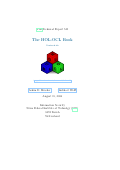The HOL-OCL Book
by Achim D. Brucker and Burkhart Wolff
 HOL-OCL is an interactive proof environment for the Object Constraint Language (OCL). It is implemented as a shallow embedding of OCL into the Higher-order Logic (HOL) instance of the interactive theorem prover Isabelle. HOL-OCL defines a machine-checked formalization of the semantics as described in the standard for OCL 2.0. This conservative, shallow embedding of UML/OCL into Isabelle/HOL includes support for typed, extensible UML data models supporting inheritance and subtyping inside the typed lambda-calculus with parametric polymorphism. As a consequence of conservativity with respect to higher-order logic (HOL), we can guarantee the consistency of the semantic model. Moreover, HOL-OCL provides several derived calculi for UML/OCL that allow for formal derivations establishing the validity of UML/OCL formulae. Elementary automated support for such proofs is also provided top
HOL-OCL is an interactive proof environment for the Object Constraint Language (OCL). It is implemented as a shallow embedding of OCL into the Higher-order Logic (HOL) instance of the interactive theorem prover Isabelle. HOL-OCL defines a machine-checked formalization of the semantics as described in the standard for OCL 2.0. This conservative, shallow embedding of UML/OCL into Isabelle/HOL includes support for typed, extensible UML data models supporting inheritance and subtyping inside the typed lambda-calculus with parametric polymorphism. As a consequence of conservativity with respect to higher-order logic (HOL), we can guarantee the consistency of the semantic model. Moreover, HOL-OCL provides several derived calculi for UML/OCL that allow for formal derivations establishing the validity of UML/OCL formulae. Elementary automated support for such proofs is also provided top
Keywords: security, SecureUML, UML, OCL, HOL-OCL, model-transformation
Categories: ,
Documents: (full text as PDF file)
 Please cite this article as follows:
Please cite this article as follows:
Achim D. Brucker and Burkhart Wolff.
The HOL-OCL Book. ETH Zurich, Technical Report 525, 2006.
Keywords: security, SecureUML, UML, OCL, HOL-OCL, model-transformation
(full text as PDF file) (BibTeX) (Endnote) (RIS) (Word) (

| abstract | = | {HOL-OCL is an interactive proof environment for the Object Constraint Language (OCL). It is implemented as a shallow embedding of OCL into the Higher-order Logic (HOL) instance of the interactive theorem prover Isabelle. HOL-OCL defines a machine-checked formalization of the semantics as described in the standard for OCL 2.0. This conservative, shallow embedding of UML/OCL into Isabelle/HOL includes support for typed, extensible UML data models supporting inheritance and subtyping inside the typed lambda-calculus with parametric polymorphism. As a consequence of conservativity with respect to higher-order logic (HOL), we can guarantee the consistency of the semantic model. Moreover, HOL-OCL provides several derived calculi for UML/OCL that allow for formal derivations establishing the validity of UML/OCL formulae. Elementary automated support for such proofs is also provided top}, | |
| author | = | {Achim D. Brucker and Burkhart Wolff}, | |
| bibkey | = | {brucker.ea:hol-ocl-book:2006}, | |
| institution | = | {ETH Zurich}, | |
| keywords | = | {security, SecureUML, UML, OCL, HOL-OCL, model-transformation}, | |
| language | = | {USenglish}, | |
| number | = | {525}, | |
| = | {https://www.brucker.ch/bibliography/download/2006/brucker.ea-hol-ocl-book-2006.pdf}, | ||
| title | = | {The {HOL-OCL} Book}, | |
| url | = | {https://www.brucker.ch/bibliography/abstract/brucker.ea-hol-ocl-book-2006}, | |
| year | = | {2006}, |